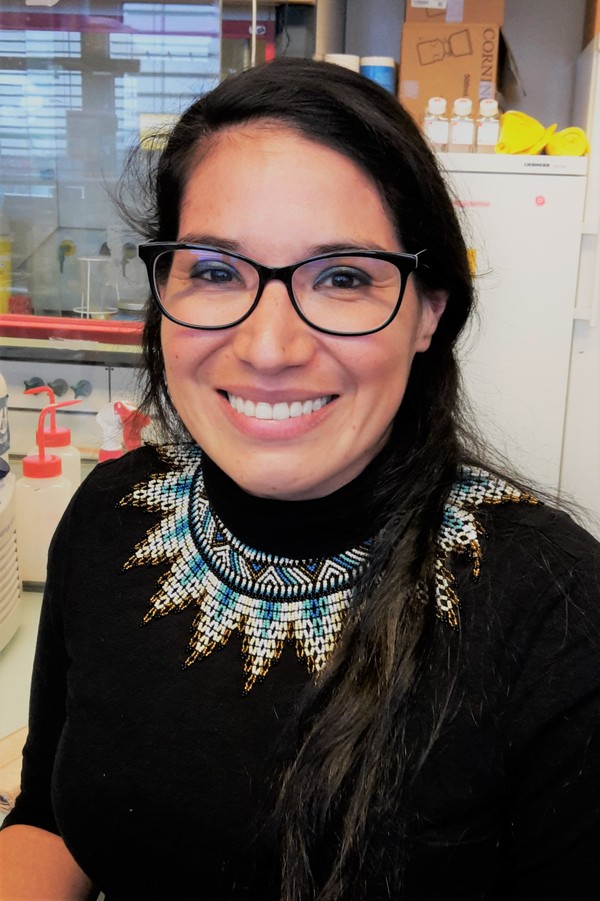Isabel obtained her PhD in 2011 from the University of Montpellier, under the supervision of Pr. Jamal Tazi at the Institute of Molecular Genetics. During her PhD, Isabel studied the regulation of the alternative splicing of the Fibronectin (FN1) and Lamin A/C (LMNA) genes, and their role in host cell invasion(1), aging(2) and metabolism(3,4). Importantly, the alternative splicing of the LMNA gene was highly sensitive to the levels of specific Serine-Arginine rich (SR) proteins(5), and produced several splicing isoforms that affect adipose tissue metabolism and aging in opposite manners, with Lamin A and Progerin promoting energy expenditure and aging, while Lamin C favors slower metabolism and moderately slows the aging process in mice(4).
In 2012 she joined the lab of Pr. Lluis Fajas at UNIL and investigated the role of the cell cycle regulator CDK4 in metabolism. Her contributions place as a key molecular hub, that regulates key signaling pathways to coordinate cell metabolism and cellular function and overall promote anabolism in the context of cycling cells and in differentiated tissues(6-8). Namely, CDK4 promotes the insulin signaling pathway in white adipose tissue(7), while directly repressing the AMPK signaling pathway(6).
From September 2017 develops her independent research program as SNSF Prima fellow at the CIG on the role of SR proteins in metabolism.
Research
RNA splicing is a key phase in gene expression in eukaryotic cells. Alternative splicing involves the differential joining of exonic sequences within a nascent pre-mRNA transcript, to form distinct mature mRNAs. Alternatively, spliced mRNAs typically encode distinct proteins or harbor modified cis-regulatory elements, thereby altering the level of protein expression. Nearly all multi-exon mammalian genes undergo alternative splicing in a tissue specific or signal-induced manner, however the regulatory mechanisms and functional consequences of such splicing changes have been well characterized only for a small fraction of genes. Little information is available about how post-transcriptional RNA processing regulates metabolic adaptation in adipose tissue depots. Despite the wealth of data concerning adipose tissue metabolic alterations in conditions of obesity and insulin resistance, the involvement of RNA splicing and other post-transcriptional RNA processing events in these processes remains poorly studied.
Our research focuses on the roles of two particular RNA binding proteins of the SR protein family, SRSF1 and SRSF2, in metabolism and adipose tissue biology. We particularly focus on how these proteins participate in the onset and development of diet-induced obesity and insulin resistance.
To develop our research, we use tissue-specific knockout mice, as well as cellular models of adipocytes. We use modern molecular biology, cellular biology and RNA sequencing approaches, in addition of metabolically phenotyping our conditional knockout models.
Representative Publications
Lopez-Mejia IC, De Toledo M, Della Seta F, Fafet P, Rebouissou C, Deleuze V, et al. Tissue-specific and SRSF1-dependent splicing of fibronectin, a matrix protein that controls host cell invasion. Mol Biol Cell 2013;24:3164-76
Osorio FG, Navarro CL, Cadinanos J, Lopez-Mejia IC, Quiros PM, Bartoli C, et al. Splicing-directed therapy in a new mouse model of human accelerated aging. Sci Transl Med 2011;3:106ra7
de Toledo M, Lopez-Mejia IC, Cavelier P, Pratlong M, Barrachina C, Gromada X, et al. Lamin C Counteracts Glucose Intolerance in Aging, Obesity and Diabetes Through beta-Cell Adaptation. Diabetes 2020
Lopez-Mejia IC, de Toledo M, Chavey C, Lapasset L, Cavelier P, Lopez-Herrera C, et al. Antagonistic functions of LMNA isoforms in energy expenditure and lifespan. EMBO Rep 2014;15:529-39
Lopez-Mejia IC, Vautrot V, De Toledo M, Behm-Ansmant I, Bourgeois CF, Navarro CL, et al. A conserved splicing mechanism of the LMNA gene controls premature aging. Hum Mol Genet 2011;20:4540-55
Lagarrigue S*, Lopez-Mejia IC*, Denechaud PD, Escote X, Castillo-Armengol J, Jimenez V, et al. CDK4 is an essential insulin effector in adipocytes. J Clin Invest 2016;126:335-48 (*co-first authors)
Lopez-Mejia IC, Lagarrigue S, Giralt A, Martinez-Carreres L, Zanou N, Denechaud PD, et al. CDK4 Phosphorylates AMPKalpha2 to Inhibit Its Activity and Repress Fatty Acid Oxidation. Mol Cell 2017;68:336-49 e6
Fajas L, Lopez-Mejia IC. CDK4, a new metabolic sensor that antagonizes AMPK. Mol Cell Oncol 2018;5:e1409862
Alumni
Eric A. Fernandez - PhD Student
Houwayda Belaid - Master Student
Maria G. Sanchez-Alonso - Visiting scientist
Ishrak Ramyan - SUR Student

